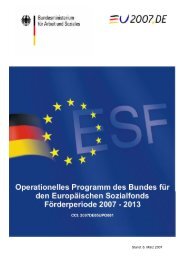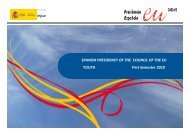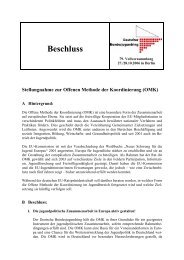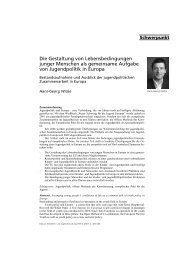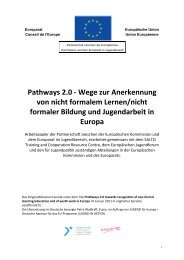National Quality Standards Framework (NQSF) - Homeless Agency
National Quality Standards Framework (NQSF) - Homeless Agency
National Quality Standards Framework (NQSF) - Homeless Agency
Create successful ePaper yourself
Turn your PDF publications into a flip-book with our unique Google optimized e-Paper software.
Step 5: Engage in the external assessment process<br />
The external assessment process (see Part 4: Section 4.1) validates the practical and qualitative aspects of youth<br />
work provision. External assessment takes place in Year 1 of implementation of the <strong>NQSF</strong> – and thereafter, in Year 1 of<br />
every 3-year cycle. (In the intervening years, organisations will be required to continue to progress the actions in their<br />
Continuous Improvement Plan and to complete a shortened Progress Report in conjunction with the VEC Officer/<br />
<strong>NQSF</strong> <strong>Standards</strong> Officer.)<br />
To ensure that the <strong>NQSF</strong> has sufficient regard for youth work practice, three key sources of evidence will form part of<br />
the external assessment process – a review of documentary evidence, observations on practice and focus groups with<br />
stakeholders (see below). These will indicate support for the achievement of the core principles and standards in the<br />
<strong>NQSF</strong> and provide an opportunity to ensure that the position taken by the organisation on the scale of attainment is<br />
validated in practice.<br />
Documentary evidence<br />
The VEC Officer/<strong>NQSF</strong> <strong>Standards</strong> Officer will request to review the documentary evidence cited and will discuss the<br />
basis on which the organisation assigns itself a position on the scale of attainment. All evidence will be retained locally<br />
by the organisation and will be made available upon request to the VEC Officer/<strong>NQSF</strong> <strong>Standards</strong> Officer.<br />
13<br />
Observations on practice<br />
This aims to provide an opportunity for more practical examples of quality youth work to be observed and, where<br />
appropriate, fed back as further indicators, which may, in turn, inform the ongoing development of the <strong>NQSF</strong>. The VEC<br />
Officer/<strong>NQSF</strong> <strong>Standards</strong> Officer will ask to observe a specific area of practice that indicates support for a particular<br />
core principle or standard in the <strong>NQSF</strong>. Examples of practice to be observed should be part of the overall and ongoing<br />
programmes offered, and not specifically ‘set up’ for the sole purpose of showcasing practice. The areas of youth work<br />
provision to be observed should be considered in relation to the core principle or standard supported and the position<br />
taken by the organisation on the scale of attainment.<br />
Focus groups with stakeholders<br />
In assessing the progress of an organisation and its services in the <strong>NQSF</strong> process, the views of stakeholders (such as<br />
staff, management, young people and volunteers) must be taken into account. This input is crucial in providing evidence<br />
of quality service delivery and should be carried out through focus groups within the organisation. It is essential that<br />
young people are included among these stakeholders so as to ensure that their views, attitudes and experiences are<br />
recognised and are regarded as central to the process.



